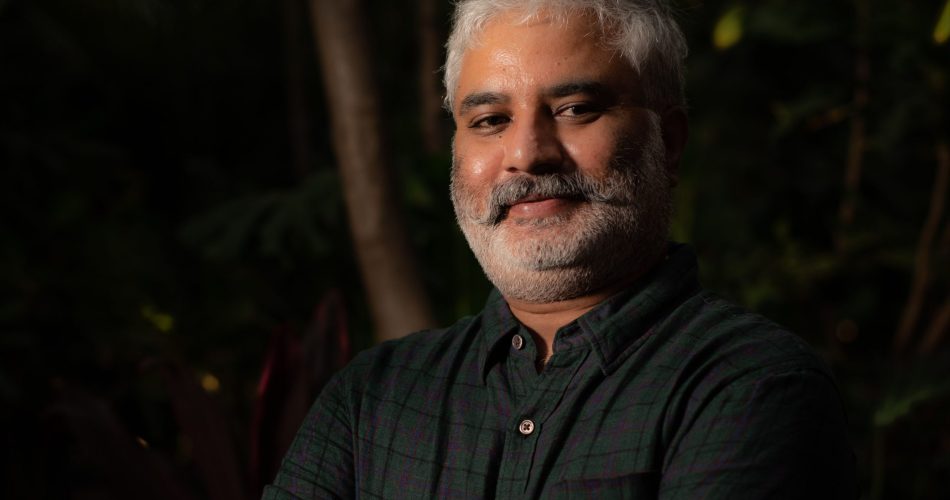Bannur mutton, as I discovered from a publication brought out by the Karnal, Haryana-based National Bureau of Animal Genetic Resources, comes from one of the four breeds of sheep that Karnataka is famous for. These short-legged, long-eared animals are named after Mandya, the district sandwiched between Bengaluru and Mysuru in southern Karnataka, but are better-known as Bannur or Bandur sheep, after the one village in Malvalli taluka celebrated for its fat-rich, melt-in-the-mouth mutton regarded as India’s answer to Japan’s fabled ‘wagyu’ beef from Kobe.

We The Chefs presented the pleasures of this expensive mutton, prized for being finely marbled because of its fat content, cooked by Karnivore Kitchen’s Kalyan Gopalakrishna, an investment banker who became a home chef in 2011, far removed from his old world of derivatives and forensic auditing. Now regarded as the leading champion of Bannur mutton, and of Old Bangalore’s Natti Cuisine, Gopalakrishna was at the We The Chefs Experience Centre in Gurgaon this past weekend, presenting curated lunches that could only be described as finger-licking good.
Kalyan’s family has been living in Bengaluru since the early 1800s, at a time when it was a cantonment town, and when Indians were all settled in an area now known as Nagarthpet. The specific part of this swathe of old Bengaluru where the ancestors of Kalyan’s father first moved in was, and is, famous as Cubbonpet. The family came from present-day Andhra Pradesh after the decline of the Vijayanagara Empire and being from the Devanga caste, settled down as weavers and merchants of the acclaimed ‘Bangalore silks’. Kalyan’s father was one of the first members of his family to move away from the textile business and become an engineer.
So, if there’s someone who can speak with authority on Old Bengalore’s ‘natti’ (local or ‘desi’) cuisine, it is Kalyan. His mother’s family had also moved to Bengaluru in the mid-1800s from neighbouring Hospet, now well-known for its automotive parts industry, where they owned land and had a farmhouse, where Kalyan remembers spending many a vacation, till recently. The Bangalore cuisine therefore is eclectic, borrowing from the most delicious Andhra and Tamil influences, but in a class of its own.
Our feast with Kalyan began with his signature single-ingredient dish – Kothmir Chicken cooked with coriander in every form (leaves, stalk, seeds and powder) and served atop a mini dosa. That set us in the mood for another palate tickler, Masala Prawns served with Mini Idlis, and then came the fiery Chilli Bannur Mutton, as soft as butter and as hot as Kim Kardashian, which required the accompanying Akki (rice flour) Roti to douse the fire set off by its green chilli-led masala. It is the kind of dish that makes you want more even as you are sweating and asking for a refill of your Pina Colada.
These starters were followed by a preparation served traditionally to a newly-wed woman before she set off for her husband’s home. It consists of idiyappam (known in Old Bangalore terminology as Ottu Shavige) drenched in the gravy of a chicken curry. No meat in it, but the hint of wholesome chicken in every bite. It could be called a palate cleanser for the next two dishes that came loaded with the goodness of Bannur mutton.
First off the block were the chops served interestingly with Pongal, a rice preparation you’d normally have for breakfast down South, but the combination worked like clockwork. It was followed by Kalyan’s signature Bannur Mutton Pulao (being a classicist, he insists that it’s not a biryani), where the delicate pieces of meat are pulled out from the neck region and cooked in their own fat, and the short-grained ‘jeera samba rice’ is prepared with coconut milk and a masala made specifically for the Bannur mutton pulao. The two when mixed together produce what can only be called an umami bomb.
We ended the meal with Payasam from the kitchen of another We The Chefs stalwart, Prima Kurien, paired with a shot of The Secret Orchard, a gently flavoured coffee and hazelnut liqueur from the makers of Samasara gin. It was an apt conclusion to a memorable meal – and of course, an invitation to an extended siesta!
To get in touch with chefs such as Kalyan, log on to www.wethechefs.in

